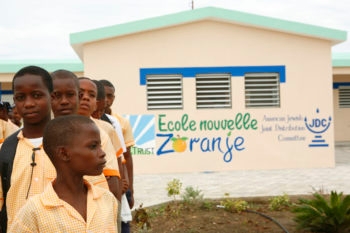
Haitians learning new building skills in a village outside Port-au-Prince with the help of World ORT, May 2010. ((Courtesy American Jewish Joint Distribution Committee))

Schoolchildren from the Haitian town of Zoranje standing outside their middle school that was built by the American Jewish Joint Distribution Committee. (Courtesy American Jewish Joint Distribution Committee)
NEW YORK (JTA) — It was the poor construction.
There had been many earthquakes more powerful than the one that hit Haiti nearly three years ago, and there have been many more since. But few have been deadlier.
When the tremor registering 7.0 on the Richter scale struck on Jan. 12, 2010, it flattened countless rows of ramshackle houses in the impoverished capital of Port-au-Prince, burying their inhabitants beneath a pile of smoking rubble. The death toll is still uncertain; estimates vary from 46,000 to the Haitian government’s official tally of more than 300,000.
But if an earthquake does strike again, which is likely given that the country sits atop a tectonic hotspot, Jewish NGOs can claim some credit for potentially reducing future casualties.
“We did a program with World ORT for builders in Haiti teaching them better building techniques,” said Judy Amit, the global director of the American Jewish Joint Distribution Committee’s international development program. “We trained over 1,200 people. Now these builders are out working, and if there is another earthquake the buildings will be much safer.”
JDC is one of at least five Jewish relief agencies currently engaged in aid work in Haiti, alongside the American Jewish World Service, World ORT and the Israeli nonprofits IsraAid and Tevel B’Tzedek. In all, Jewish nongovernmental organizations raised at least $16.2 million for Haiti relief.
More than half of that sum has come from JDC alone, which has spent nearly $8.8 million in donations from the Jewish Federations of North America and from individual donors who earmarked their contributions for Haiti relief. The funds have helped renovate the University Hospital of Haiti in Port-au-Prince; build a middle school in the town of Zoranje; supply artificial limbs to amputees; and dispatch groups such as the Bond Street Theatre to empower Haitian women through performance art.
“We look back at three years where our impact is evident and we’re still at work there,” Amit said. “We really looked for the longest term impact.”
Most of the $16.2 million has been spent. As the remaining money dwindles, Jewish groups are expected to wind down their activity in the country. Some may be out within a year or two, others sooner.
Tevel B’Tzedek and IsraAid, both of which run humanitarian projects around the world, jointly run a training facility outside Port-au-Prince where a team of Israeli agricultural experts teach Haitian farmers how to create plant nurseries, use drip irrigation and manage pests.
“We’re trying to get a major grant from the United Nations Food and Agricultural Organization,” said Rabbi Micha Odenheimer, the founding director of Tevel B’Tzedek. “But if we don’t get it we’re going to run out of funds in February.”
Odenheimer hopes Tevel B’Tzedek can continue its work in the country for at least another year, but first the money must be found. The American Jewish Committee, the UJA-Federation of Toronto and others are now paying for the group’s efforts in Haiti.
While many relief agencies have exhausted or are nearing exhaustion of their funds, the American Jewish World Service still has about a third of the $6.5 million it raised for Haiti. AJWS President Ruth Messinger said the group deliberately spread its resources over a longer period because it considers its mission to the country permanent.
“We have two full-time people in Haiti, and they are the ones trying to advise us what are the best ways of rebuilding the country from disaster to development,” Messinger said. “We emphasize the issues that are the core, the strength of AJWS, which is human rights.”
As is frequently the case in international disaster relief, even the best intentions can sometimes backfire. Messinger said free shipments of rice intended to alleviate hunger had the adverse effect of devastating the local farming industry.
“In the case of Haiti we specifically, we the United States government, made matters worse because, responding to a very large number of displaced people from their home, the solution was let’s deliver emergency food aid,” she said. “What we actually did under that umbrella was deliver something like 60,000 metric tons of American rice to Haiti in the same month when the Haitian rice crop comes in. Haitian rice farmers said to us, ‘this just totally put me out of business.’ “
Messinger, a former New York City borough president, is now lobbying Washington to stop sending food to disaster areas. Instead, she suggests purchasing food from more local sources — a proposal she said would ensure relief arrives at its destination faster, yields more value for money and invests in local farmers instead of undermining them.
Despite an estimated $2.4 billion in aid to Haiti, progress remains stubbornly elusive. Conditions were further exacerbated last month when Hurricane Sandy killed 54 people and flooded large parts of Port-au-Prince, a fact overshadowed by the destruction wrought by the storm in the New York metropolitan area. Setbacks aside, Odenheimer said Jewish organizations have much to be proud of, though he cautioned that they be careful not to be too self-congratulatory.
“I think Israel and the Jewish community can be proud of taking a strong interest in some projects,” Odenheimer said. “But I don’t think we deserve a pat on the back yet.”





